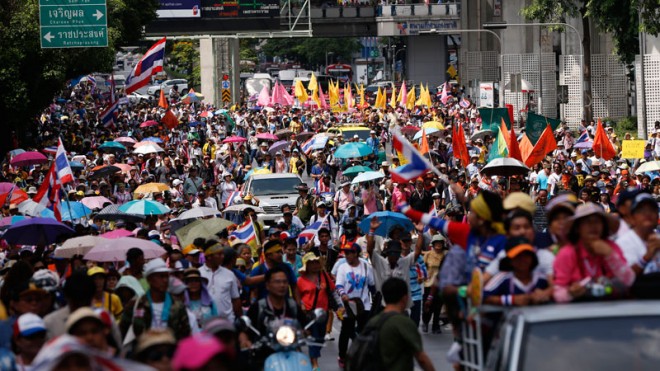Thai protesters launch ‘final fight’ as government clings on

Anti-government protesters march through a main road in downtown Bangkok, Thailand, Friday, May 9, 2014. Thailand’s anti-graft commission indicted ousted Prime Minister Yingluck Shinawatra on Thursday on charges of dereliction of duty in overseeing a widely criticized rice subsidy program, a day after a court forced her from office. Yingluck was accused of allowing the rice program, a flagship policy of her administration, to proceed despite advice that it was potentially wasteful and prone to corruption. (AP Photo/Vincent Thian)
BANGKOK — Thai protesters vowed Friday to besiege television stations and police positions as they launched a “final fight” to topple a government that is on the ropes after its leader was dismissed.
Several thousand protesters left their main encampment in a park in the city’s commercial district as their firebrand leader Suthep Thaugsuban issued a rallying cry for them to establish a parallel government.
“We will regain our sovereign power and set up a people’s government and a people’s legislative council,” Suthep said before leading a march to Government House, which has been targeted by protesters for months.
“We will march on all television stations… we ask city residents to surround police cars and police headquarters to stop them from hurting our people,” he added.
Suthep is known for his hyperbolic statements and, with the government weakened but still standing, the call for a unilateral administration appears to lack any legal ground.
Article continues after this advertisementAlthough buffeted by the removal of Prime Minister Yingluck Shinawatra on Wednesday by the Constitutional Court on abuse of power charges, the current Puea Thai administration has staggered on.
Article continues after this advertisementIt has appointed Niwattumrong Boonsongpaisan as its new premier and won a reprieve on Thursday as the kingdom’s anti-graft panel stepped back from hauling more cabinet members into a separate indictment against Yingluck over a costly rice subsidy scheme.
There were fears the agency could have moved against the remainder of the government to complete a “judicial coup” and create a power vacuum that could have been filled by an appointed leader.
Hundreds of police were deployed to manage Friday’s protests, as fears simmered of street clashes between rival groups. Police said some 4,500 anti-government protesters were marching from their encampment at Bangkok’s Lumpini Park.
Thailand’s pro-government “Red Shirts” are set to rally Saturday in a Bangkok suburb, raising the risky prospect of the two protest groups being on the city’s streets at the same time.
At least 25 people have died and hundreds more have been wounded in gun and grenade attacks linked to six months of anti-government protests.
Both sides have armed hardcore supporters and Thailand’s recent history has been scarred by bouts of political violence.
Scores of people died in a military crackdown on “Red Shirts” occupying Bangkok’s commercial centre in 2010.
Thailand has been bitterly divided since 2006 when Yingluck’s billionaire brother Thaksin was ousted in a military coup.
Three Thaksin-aligned premiers have since been removed by the nations’ courts, sparking accusations that the judiciary is in cahoots with the anti-government protesters, who are drawn from the Bangkok establishment and royalist south.
They hate the Shinawatras who they accuse of fostering massive corruption and draining the kingdom’s coffers to sweeten Thaksin’s rural electoral base in the poor but populous north and northeast.
The opposition also accuse Thaksin of undermining the nation’s beloved but ailing king.
Thaksin lives overseas to avoid jail for corruption convictions he contends were politically motivated, but still draws loyalty from his rural heartlands who have voted his parties into power in every election since 2001.
RELATED STORIES
Thailand’s first female PM skewered by courts and family ties
Prime Minister Yingluck Shinawatra summoned by anti-graft panel